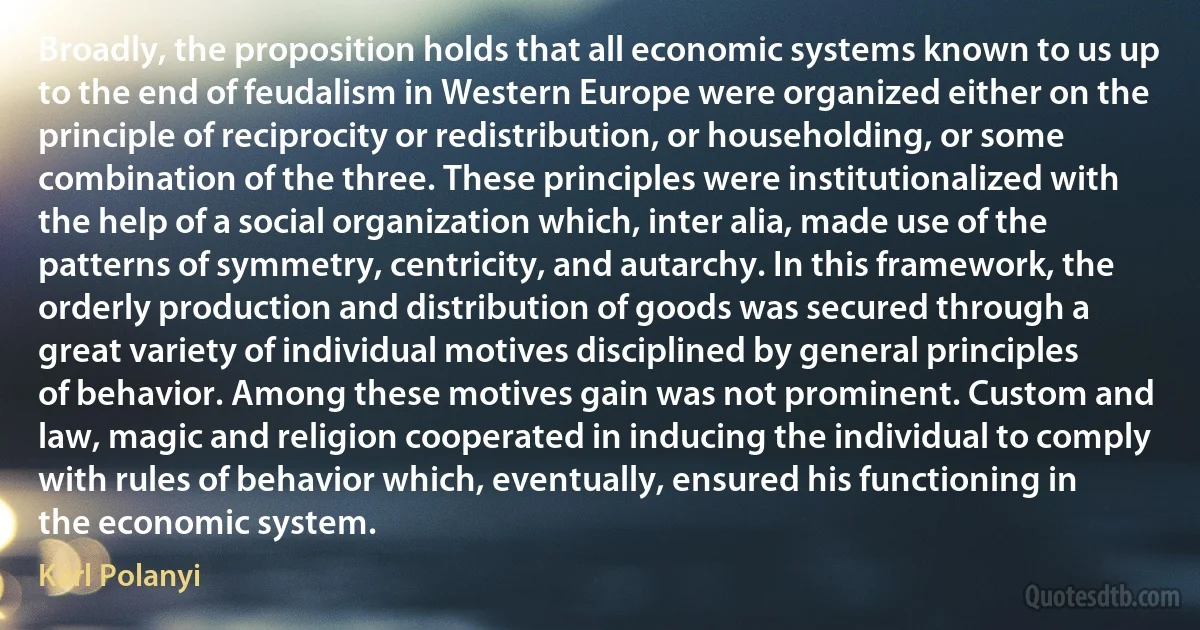
Broadly, the proposition holds that all economic systems known to us up to the end of feudalism in Western Europe were organized either on the principle of reciprocity or redistribution, or householding, or some combination of the three. These principles were institutionalized with the help of a social organization which, inter alia, made use of the patterns of symmetry, centricity, and autarchy. In this framework, the orderly production and distribution of goods was secured through a great variety of individual motives disciplined by general principles of behavior. Among these motives gain was not prominent. Custom and law, magic and religion cooperated in inducing the individual to comply with rules of behavior which, eventually, ensured his functioning in the economic system.
Karl PolanyiRelated topics
custom distribution end feudalism gain general goods great help inducing known law orderly organization production reciprocity religion symmetry three use western functioning rules redistributionRelated quotes
The universe is of the nature of a thought or sensation in a universal Mind... To put the conclusion crudely - the stuff of the world is mind-stuff. As is often the way with crude statements, I shall have to explain that by "mind" I do not exactly mean mind and by "stuff" I do not at all mean stuff. Still that is about as near as we can get to the idea in a simple phrase. The mind-stuff of the world is something more general than our individual conscious minds; but we may think of its nature as not altogether foreign to feelings in our consciousness... Having granted this, the mental activity of the part of world constituting ourselves occasions no great surprise; it is known to us by direct self-knowledge, and we do not explain it away as something other than we know it to be - or rather, it knows itself to be.

Arthur Eddington
Corporations are necessary to the effective use of the forces of production and commerce under modern conditions. We cannot effectively prohibit all combinations without doing far-reaching economic harm; and it is mere folly to do as we have done in the past-to try to combine incompatible systems-that is, to try both to prohibit and regulate combinations. Combinations in industry are the result of an imperative economic law which cannot be repealed by political legislation. The effort at prohibiting all combination has substantially failed. The only course left is active corporate regulation – that is, the control of corporations for the common good-the suppression of the evils that they work, and the retention, as far as maybe, of that business efficiency in their use which has placed us in the forefront of industrial peoples.

Theodore Roosevelt
A long decade ago economic growth was the reigning fashion of political economy. It was simultaneously the hottest subject of economic theory and research, a slogan eagerly claimed by politicians of all stripes, and a serious objective of the policies of governments. The climate of opinion has changed dramatically. Disillusioned critics indict both economic science and economic policy for blind obeisance to aggregate material "progress," and for neglect of its costly side effects. Growth, it is charged, distorts national priorities, worsens the distribution of income, and irreparably damages the environment. Paul Erlich speaks for a multitude when he says, "We must acquire a life style which has as its goal maximum freedom and happiness for the individual, not a maximum Gross National Product."

James Tobin
The general co-operation of all members of society for the purpose of planned exploitation of the forces of production, the expansion of production to the point where it will satisfy the needs of all, the abolition of a situation in which the needs of some are satisfied at the expense of the needs of others, the complete liquidation of classes and their conflicts, the rounded development of the capacities of all members of society through the elimination of the present division of labor, through industrial education, through engaging in varying activities, through the participation by all in the enjoyments produced by all, through the combination of city and country – these are the main consequences of the abolition of private property.

Friedrich Engels
Imagine each family as a kind of little factory--a multiperson unit producing meals, health, skills, children, and self-esteem from market goods and the time, skills, and knowledge of its members. This is only one of the remarkable concepts explored by Gary Becker in his landmark work on the family. Becker applies economic theory to the most sensitive and fateful personal decisions, such as choosing a spouse or having children. He uses the basic economic assumptions of maximizing behavior, stable preferences, arid equilibria in explicit or implicit markets to analyze the allocation of time to child care as well as to careers, to marriage and divorce in polygynous as well as monogamous societies, to the increase and decrease of wealth from one generation to another.

Gary Becker
